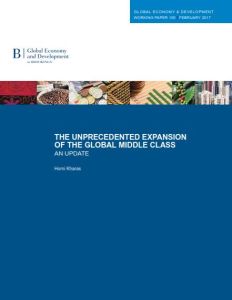Join getAbstract to access the summary!

Join getAbstract to access the summary!
Homi Kharas
The Unprecedented Expansion of the Global Middle Class
An Update
Brookings Institution, 2017
What's inside?
The worldwide middle class will increase to five billion by 2028, affecting the economy and the environment.
Recommendation
Globalization has expanded the market for goods and services worldwide, and the rise of the middle class in developing countries offers a growing consumer base that provides businesses with enormous opportunities. Economist and policy expert Homi Kharas looks into the implications that the growth of the global middle class – which he predicts will reach the five billion mark by 2028 – holds for the environment and the economy. getAbstract recommends his informative though quantitative report to social scientists, economists and marketers.
Summary
About the Author
Homi Kharas is deputy director of the Global Economy and Development Program at the Brookings Institution.





















Comment on this summary